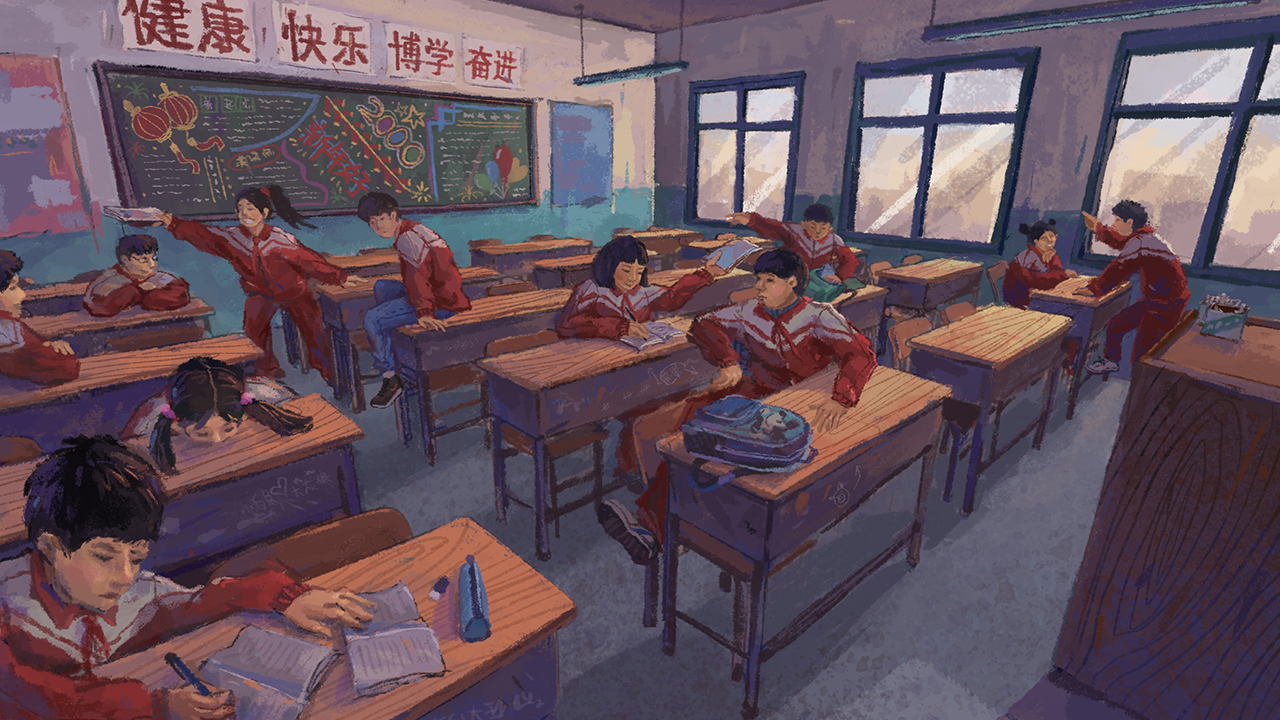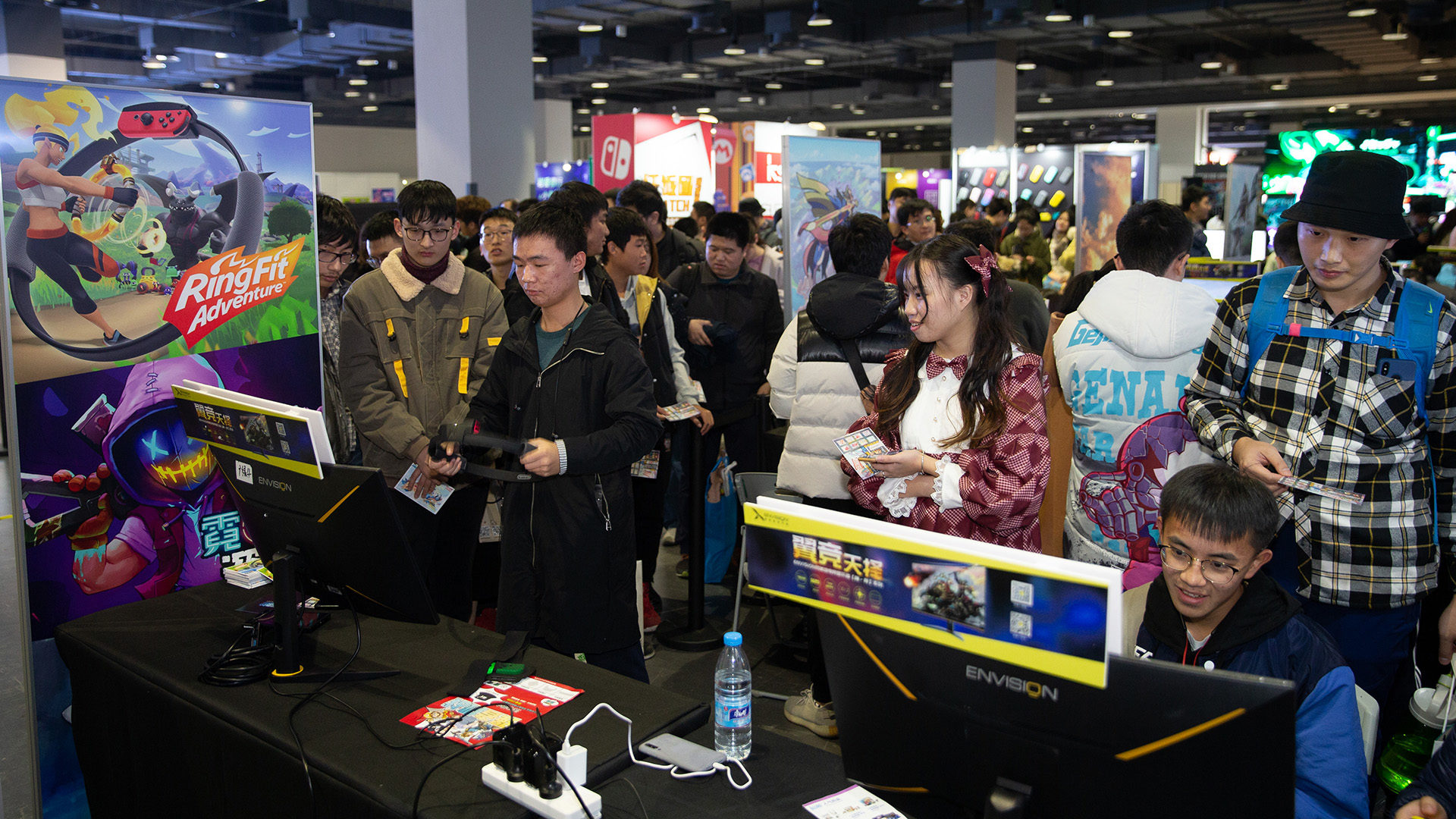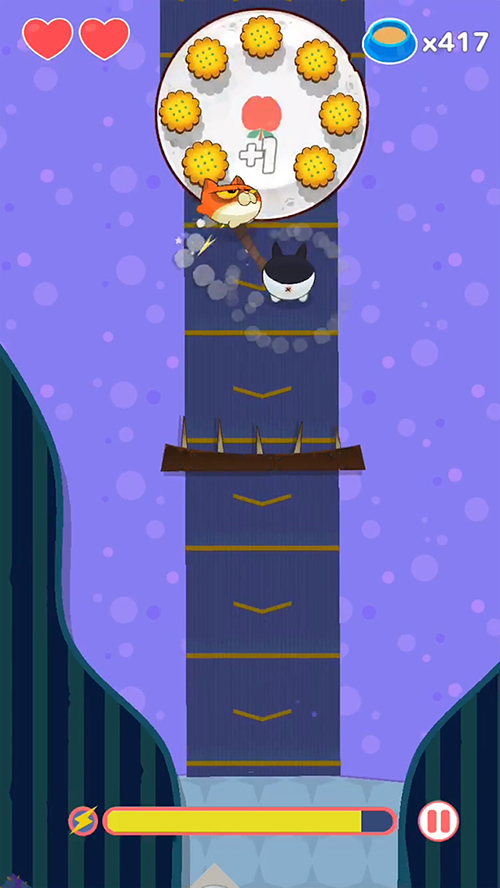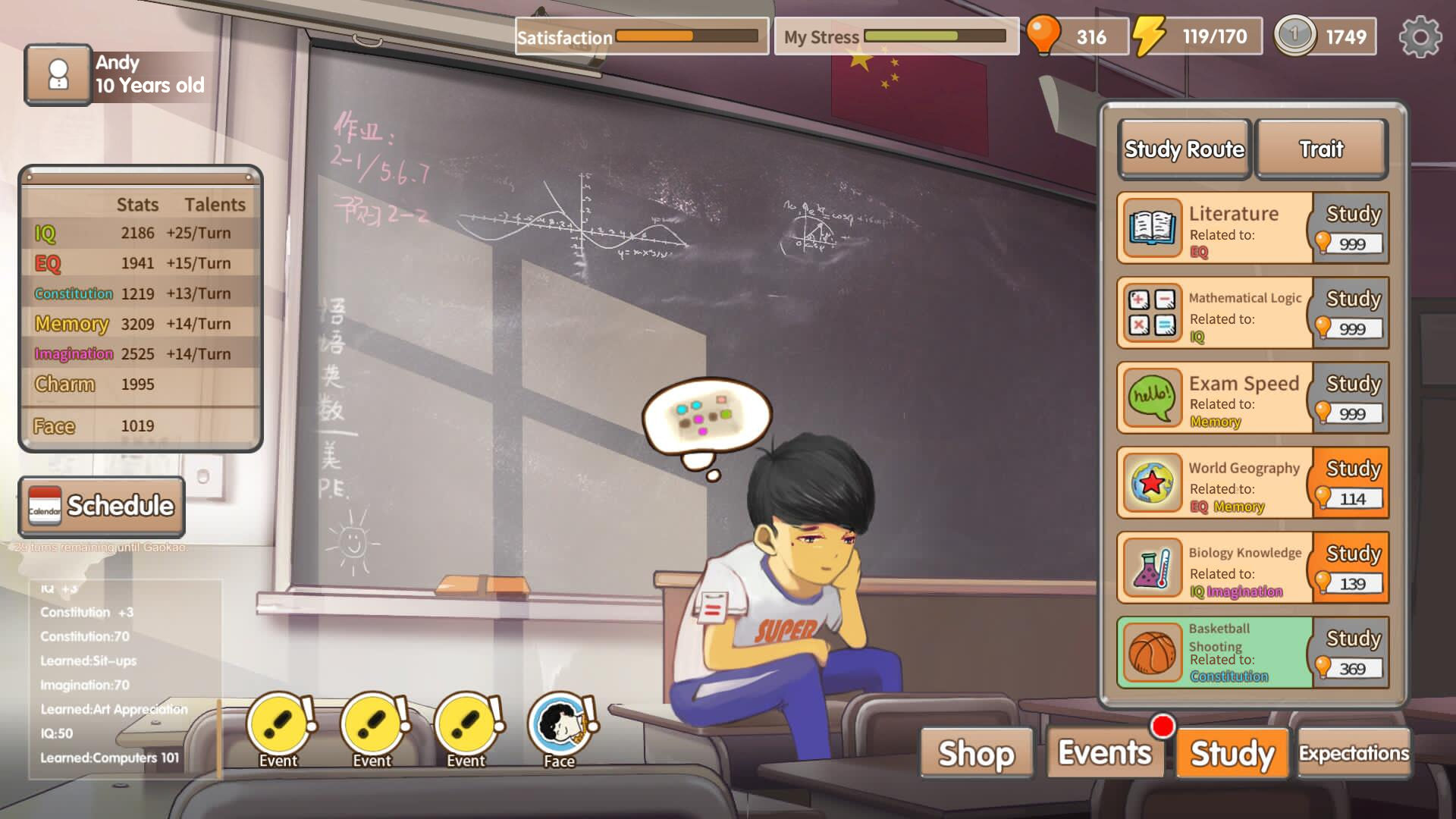How would you spend an entire week’s budget? Kevin, a game designer and an industry veteran from China, told me he saw a young man burn through 40 RMB—an amount that would have lasted him a week—on a game in an internet cafe back in 1995. Kevin1A pseudonym to protect his identity. spotted him in the early morning, his head and arms sprawled across the table after he’d exhausted himself from an overnight gaming session. “The boss told me that the guy sleeping over there, he just stayed up all night to play a game,” he said. “When I ask the boss what game he was playing, the boss tells me—and I’ll remember this my whole life—that it was Go. He spent the whole of his money to play Go on PC for over eight hours.”
The virtual version of Go, a popular board game in China and Japan, may not be a particularly absorbing example of a video game, especially to seasoned gamers. But back then, for many Chinese students who’d just completed the phenomenally stressful college placement exams—known as gaokao (高考)—their first gaming experience might have been similarly intense. Ahead of these crucial entrance exams for Chinese students, parents often place great emphasis on studying, preventing their children from partaking in frivolous activities like video games until their exams are over. After that, the world’s their oyster; students are given an almost unprecedented degree of freedom to do whatever they want. “Their parents will give them lots of space, telling them, ‘I don’t really care what you do, just don’t do something illegal and you can arrange for your own time.’ The difference [from before they attend college to after] is so big,” Kevin added.
That’s partly why gaming was far from a mainstream hobby in the earliest days of the Chinese gaming scene, unlike its Western and Japanese counterparts. The explosive growth of PC and mobile gaming within the country in recent years departs from a status quo that has its roots in the 1970s. Back then, as arcade and home gaming entered its first boom in Japan, the U.S., and Europe, China was in the midst of political and economic reforms that meant it largely missed out. In the 1990s, when a flood of new consoles from Japan led to a surge in popularity, the Chinese government grew increasingly concerned over the potential for addiction. Compounding this worry was the public perception that video games could lead to the moral degradation of Chinese youth by interfering with their studies for the gaokao. In 2000, these attitudes culminated in the country’s infamous ban on video game consoles.
“About 20 years ago in the mainstream, video games were described with a very strong word, which translates as digital heroin,” shared Kevin. “Back in the day if you said, ‘I really love games,’ or ‘I’m a gamer, I play arcade games maybe an hour a day,’ people would see you as a bad student. At the very beginning, due to the reports in the mainstream [media], people already have a very strong bias [against video games].”
In the absence of consoles, PC gaming became exceedingly popular, and free-to-play games like MMORPGs and MOBAs flourished. Yet even when the games themselves are free to start, high-end, gaming-capable PCs can prove prohibitively expensive. “When I was a freshman, IBM PCs were really expensive—much more expensive than video game consoles, maybe double the price,” Kevin said. Where some saw a problem, others spotted an opportunity to make a quick buck. “Some people living near the college would rent a house—a very small house, maybe less than 20 square meters—they would put two to six computers there and say, ‘You can rent the computer to play games on PCs for about 5 RMB.’” Internet cafes like these became increasingly prevalent; by 2015, there were about 146,000 of them in the country.
Likewise, China’s independent gaming scene emerged slowly. Local developer Eddy Hu witnessed the steady growth of an indie game developer community in the 2000s—one he was an active member of. “We had a forum online called indieplanet.net. A lot of indie game developers gathered around in that community,” he said. ”From that community, we got Coconut Island [a renowned Chinese studio and publisher] after that, and a lot more indie games.”

Credit: Ustwo Games
While this wasn’t the earliest instance of independent game development in China—in a 2018 TechNode interview, Spotlightor Interactive founder Gao Ming referred to it as a “second generation” following pioneering efforts in the ’90s—Kevin cited a similar timeline, chalking up this burgeoning interest in games to the emergence of mobile games during the period. That was when the increasing adoption of smartphones introduced more games to the general population, rather than just a niche market of gaming enthusiasts. This boom was bolstered by the popular—and very emotional—mobile game Monument Valley from Ustwo Games, which caused many to see that games could be powerful and evocative. “That was a milestone back in 2014,” Kevin said. “This game totally blew a lot of people’s minds… That redefined what a video game is. It was the first time a lot of iPhone users and gamers realized that video games can be art, video games can be so inspiring rather than pay-to-win.”
Like Hu, many assign Coconut Island particular credit for growing the country’s indie games scene. The studio’s founders started a local developer community called IndieACE, eventually hosting game jams across the country, including in cities like Shanghai, Shenzhen, and Guangzhou. The jams soon evolved into the China Indie Game Alliance (CIGA), which grew into one of China’s largest game developer communities. Since then, Hu noted, the community has exploded rapidly—with the number of participants swelling from just 20 developers in the first game jam in 2011 to 800 jammers across five cities in 2016.
Yet this growth hasn’t made things easier for the indie developers. Gaming is still largely dominated by free-to-play MMORPGs and MOBAs, where pay-to-win mechanics are rife and enormously popular among Chinese players. Concerned about these gambling-like features and video game addiction—a trend that top officials believe is the root of nearsightedness and poor academic results in students—the government imposed gaming curfews for younger players.
At the same time, a regulatory overhaul within the government saw a freeze on game license approvals starting March 2018, which only thawed about a year later. This had a chilling effect on indie developers, many of whom were barely keeping their heads above water. That’s because without a games license, Chinese studios are unable to publish and sell their games on any games platform in the country.
That is, except for Steam.
For many indie developers, Steam was the one blind spot through which they were able to sell their games in China without a license—and therefore keep their studios afloat. Even with the licensing freeze now lifted, many developers continue to take advantage of this loophole. That’s because securing a license has become an incredibly thorny affair. The process has stumped even gaming behemoth Tencent, which has famously struggled to get the licenses it needs to publish its games.

Credit: Coconut Island
One reason developers try to avoid the licensing process is its vague requirements; there are no set guidelines for game developers to follow. Jack2A pseudonym to protect his identity., who works for a Chinese games publisher, told me that even most local developers are unsure of the exact details. Hu also said he had to rely on the game publisher he is working with to sort these details out as well.
“It’s a bit complex. Almost impossible for a solo developer,” Jack said. “You need to get the copyright files in China, which is not expensive, but you’d better have a partner in China to help you with it; then you must have a partner in China to help you to get the game license.” Developers told me that it isn’t a matter of just submitting an application to the appropriate department and requesting for a license. Instead, they have to work with a traditional publishing house—yes, those that publish books and other literature—which will apply for the license on the developer’s behalf. If the license is awarded, developers will have to send monthly reports to this publishing house.
In addition, devs still need to work with a game publisher to launch their games—and there aren’t a lot of them in the country. Being a game publisher means having the right licenses and certificates in place too, including the Internet Content Provider (ICP) license required for any ecommerce within China. Solo developers or small studios in particular can struggle to navigate the complex bureaucracy involved, and since established game publishers may meet the requirements more easily, it becomes essential for most game developers to work closely with them.
Making this process even more arduous for developers is that the timeframe for approval can be between four and six months—and this doesn’t include the time needed to prepare a proposal for the application, which can be an additional month. Jack showed me an incomplete example of a proposal via email: a lengthy report that’s over 60 pages long. It included extensive write-ups on the game, such as a detailed explanation of the gameplay and narrative, all the characters that are featured (including animals you meet, like a cow or a pigeon on the street), a thorough walkthrough—complete with screenshots—and even a section that delves into what differentiates the title from other games in the market. If the game has a loot box mechanic, it’s compulsory for developers to include its drop rates, as well as anti-addiction measures they have implemented.
According to Jack, these are a few criteria that developers have to take note of:
- Games should be DRM-free
- All text must be in Chinese, including any in-game road signs or posters
- No coarse language such as vulgarities
- No sexual content or nudity
- No discussion or references to terrorism
- No anti-China, anti-communist, or anti-socialist messages
- No references to real-world incidents, such as riots and crimes
- No references to the Chinese government and related topics, such as the president and officials
- The Health Game Advisory, a short paragraph that reminds players on healthy gaming habits, should be displayed for at least six seconds when the game is launched
Finally, there’s the exorbitant cost of the application; Kevin told me that each application can cost developers around 10,000 RMB (or approximately $1,420). And that’s just the fee for applying for a license on a single platform. Want to publish your game on another platform, like on mobile on or the Nintendo Switch? You’ll need to apply for a separate license with its own idiosyncrasies, pay yet another fee, and repeat the entire process all over again. What’s also devastating is that the application can still get rejected, even after you’ve paid up.
Take, for example, the complications surrounding getting a Switch license. The Switch’s China-approved version, developed in partnership with Tencent, just launched this past December. While Chinese players had already been importing a gray market version of the Switch, the Tencent version only allows players to access the China eShop, which only contains games approved by the Chinese regulators.
“Developers have a choice of how to release games for the Tencent Nintendo Switch,” said Daniel Ahmad, senior analyst at Niko Partners. “The main way would be to publish a China version of the game by submitting the game to China’s gaming regulator for approval. Once approved the game can be distributed as physical cart and digital download in China. The second way is to publish a Global/Asia version of the game with Simplified Chinese localization. Tencent Nintendo Switch owners will have to import the physical cartridge from outside China in order to play the game.”

Courtesy WePlay Game Expo
Jack told me that a global approach can complicate the licensing process. “One of the steps to get the game license is that the government will check if the game has been released anywhere else. So sometimes it is risky if you have published the game on Steam or other stores. They may require the publisher to remove the games from all other stores,” he said. “The problem is that there’s no clear standard, and it depends on the reviewer’s mood a lot. The reviewer from the government may be a guy [who] never plays any games and knows very little [about] the markets.”
And the requirements are constantly in flux. Iain Garner, the co-founder of game publisher Another Indie, said that a submission also now requires the game to be about 80 percent complete, which can be a punishing requirement for indie developers. “We’re already beginning to see… a lot of Chinese developers going, ‘Well okay, we want to continue making games, but we can’t trust the government to get this through the process in time for us to stay alive.’”
Against these terrible odds, however, some of the developers have mentioned a possible recourse: a black market for game licenses, where you can pay a fee and be awarded one almost immediately. This fee, of course, is even more expensive than obtaining a legitimate license—for some, prohibitively so.
“That’s something you can use right away, but the price is really, really sky-rocketing. That price can be from 100,000 RMB [$14,214] to 200,000 RMB [$28,428],” Kevin said. “Because of [the publishing house’s] close relationship [with the relevant authorities], they can get you some sort of license or serial number, and they will say, ‘Okay, I’ll apply for an MMORPG [license], which is the most popular genre, and I’m going to sell it, and you can get the license right away because I can transfer the license to your company.’ They apply for that in advance.”
Of course, this is an extremely risky move, as noted by many developers. Hu recalled a friend who bought the license in this manner, but when they were found out, their game was swiftly brought offline. “They just [used] some license with similar name. But I don’t recommend that. It’s very risky because their game got shut down.” Jack echoed this sentiment, saying that it was a lot more more common before the gaming license freeze in 2018. “They often use these game licenses for web-based games or mobile games. Now everything has gotten stricter. [For game publishers] it’s possible to have their export licenses revoked or suspended for such things, I think.”

Credit: Tencent NEXTStudio
The other alternative, then, is to make free-to-play games; no license is required as long as there are no microtransactions. This also explains why free-to-play games have been proliferating in the country. “As long as it’s totally free, advertisement is okay. Pop-up ads are okay,” Hu said. “An example of that is OwO, a game made by Tencent’s Next Studio. What I heard from last year is they don’t have a license yet… It’s a mobile game, [so it’s] published on iOS and [Android] app stores.”
All these challenges are particularly punishing for a small indie outfit, and Garner has seen many indie studios shut down because they simply couldn’t get the funding or earn enough revenue to survive. “The Chinese industry is in a really tricky situation right now. Basically, the bigger companies will, of course, be able to survive because they will be able to kind of brute force their way [through]. It’s like, it doesn’t matter because, sure, they have to wait three months, but Tencent can afford to budget in three months of extra wages for everybody.
“But for smaller teams, that’s not an option. I mean, already a huge number of Chinese indie studios have died out. I mean, if you compare what it looks like now, compared to what it looked like five years ago. All of those small studios are gone or going just because they couldn’t survive. They have the rug pulled out from underneath them,” he added.
That’s why the opportunity to publish games on Steam without a games license seemed like an attractive alternative for developers, rather than going through the rigors of applying for approvals in China. But Steam has been operating in an unofficial capacity in the country; it’s not exactly legal, which already puts developers on shaky ground. And with the millions of titles on the platform, Chinese developers are competing for attention on the already cluttered Steam platform as they pit their games against an international market. Plus, the advent of a sanitized, government-approved Steam China is threatening to close this loophole.
The idea of Steam China has been enormously unpopular among developers—a sentiment shared by Chinese gamers, who are concerned about what will happen to their existing Steam libraries. “So the minute that Steam China comes into effect, worldwide Steam is going to either immediately stop or slowly be choked out of the ecosystem. It’s kind of a miracle that Steam has continued to operate as a loophole for as long as it has,” Garner said. “Still, the Chinese indies are working and focusing on Chinese audiences. But that’s going to change.”
Faced with these odds, indie developers have little choice but to market their games to an international audience, rather than relying on the Chinese market alone. After all, Chinese developers do not need a license to bring their games out of China. This is a conversation that many developers are already having; in fact, many of those I spoke with are eager to connect with the foreign press to get the word out about their games.
However, as Garner noted, this journey will not be an easy one for them. “I think a lot of Chinese developers are struggling. China has been a microcosm, right? Like it’s been closed off for, you know, for as long as I can remember… So the vast majority of Chinese developers know how to make Chinese games for China, and now they’re attempting to breach that wall and make more international games,” he said. “But there’s a lot of very particular quirks that the Chinese consumer likes that doesn’t translate outside. There’s a lot of very particular genres that are very popular inside China, but aren’t as popular outside China.” Free-to-play mobile games with pay-to-win mechanics, for instance, are immensely popular inside the country but get a poor reputation overseas. The divide is due in part to cultural differences: Chinese gamers are more competitive and don’t mind paying for an advantage. “And that’s something that I’m seeing a lot of developers grapple with right now, because they’ve essentially been creating games to sell inside China via Steam,” Garner said.

Credit: Spotlightor Interactive
Exacerbating this issue in local game development is the lack of accessibility to the tools most developers need to make and market their games outside of China. Take for example Discord, the voice and text messaging app that is widely used by many gamers internationally but has been blocked in China.
“The publishers in mainland China never use Discord, but we know that’s a really good tool for publishers,” Kevin said. “It’s been a pain since the government banned this app. I cannot understand why. It’s a really good tool, a good platform to maintain the relationship between the developers and the community of gamers. It’s not like Facebook—maybe you can find something on Facebook that is kind of political, but how can you find that on Discord? So I don’t understand. That platform has been banned, so that would be a really huge barrier for it to work properly [in China].”
It’s no secret that many people in China make liberal use of services called virtual private networks, or VPNs, to bypass the country’s internet filters. But Kevin told me that VPN access is also becoming a concern. Even arranging our interview with him was a bit of a challenge, as we spoke during the nation’s 70th anniversary celebration. At the time, VPNs were particularly unstable, as the Chinese government had been curbing access to servers that let people bypass the Great Firewall. When that happens, even the traditional means of accessing international sites become almost impossible. That includes the otherwise straightforward task of uploading your game to Steam. “Since two years ago, constantly the VPN won’t work,” Kevin said. “But it’s really critical for a publisher. You cannot upload your game on Steam, you cannot click the launch button. It will change everything.”
Garner explained that this is why Another Indie has moved its operations from China to Taipei. “I’m an indie publisher that was in China, and now lives in Taiwan so that I can do things. I mean, the reason why we did it was mainly because we need access to the internet. It was just a case of like, well, how can I run a publishing company when I suddenly can’t upload my trailer to YouTube, or things like that? That’s one of the reasons why we ended up relocating half of our team out of China. It was more about the actual day-to-day running of the company for us, but it has certainly allowed us to do things that we would not have been able to do were we in China.”
To many developers, however, going global is still the only long-term solution for keeping their studios alive. Xuan Li, the co-founder of Chinese games publisher Zodiac Interactive, spoke about his experiences working with local developers who are embarking on this route. “A lot of Chinese studios who have struggled with expanding their market overseas were making their very first independent game. I’m witnessing the constant failure due to the inexperience of properly running a business around the final product, even [for] several of my own games,” he said. “Secondly, China is not known as a country of originality regarding video game design. It creates a barrier that international players, press members and industry people are shielding themselves away from games from China. Luckily going international is what keeps this industry alive and some young studios have already succeeded.”
The indie games scene in China has forced developers to constantly adapt to ever-evolving circumstances. Because of this, Garner remarked, the grassroots path to a highly successful game in China—to have a game go viral locally and then sell well internationally—is probably not possible anymore. “Our most successful game, Lost Castle, was developed by… four university graduates doing their first game. And the game blew up… Because it was so popular in China, that sort of propelled it to the rest of the world. That type of grassroots thing just really can’t happen anymore.”
Another barrier to success is the lack of government support for the Chinese game industry—this despite the fact that China’s gaming market brings in more revenue than that of any other country. “I spoke with The Wall Street Journal a few months ago. And I think that the quote that they quoted me on, was that China is perfectly fine with strangling its own industry. That’s not an issue for China. Whereas in most countries, the government wants to support an industry because that industry will make money. In China, if they believe that industry has the potential for subversive elements, then the government is perfectly willing to kill that industry. And that is what has happened with the developers, is that they have just been stuck between a rock and a hard place,” Garner said.
Hu, on the other hand, chose to see recent developments in a more optimistic light, suggesting that they’ve forced indie developers to think internationally, arguably a necessity for developers of any nationality hoping to succeed these days. “Optimistically, the licensing policy actually kinda pushes Chinese devs to think more globally, because mostly they need to publish their games on global market like Steam, instead of local platforms. Trying to [integrate] into this global market, [while] at the same time keeping our own culture as one of the game’s features, is always the challenging but fun experience.” He cited Chinese Parents, an indie game developed by indie studio Moyuwan, as one successful example.

Credit: Moyuwan, Coconut Island
What left the biggest impression upon me, though, is the immense fortitude of the Chinese indie game industry. Rather than despairing over their circumstances, many developers I spoke with view them as just another set of obstacles to overcome.
Garner agrees. “They’re very pragmatic about this stuff. Where we foreigners kind of look in and see this great tragedy or this great injustice, the Chinese developers just see business as usual. A lot of them have changed or are moving on, or they’re dissolved and reforming to do something else. But the Chinese market is incredibly resilient. So I’m not worried that people are going to stop making games in China.
“Gaming in China isn’t going anywhere. It’s too big. It’s too popular. It’s too powerful.”
Some quotes have been lightly edited for clarity.
Header image credit: A Perfect Day, Coconut Island.

Khee Hoon Chan is a freelance writer and copywriter from Singapore. She has written for Unwinnable, Rock Paper Shotgun, Polygon and other fine publications.